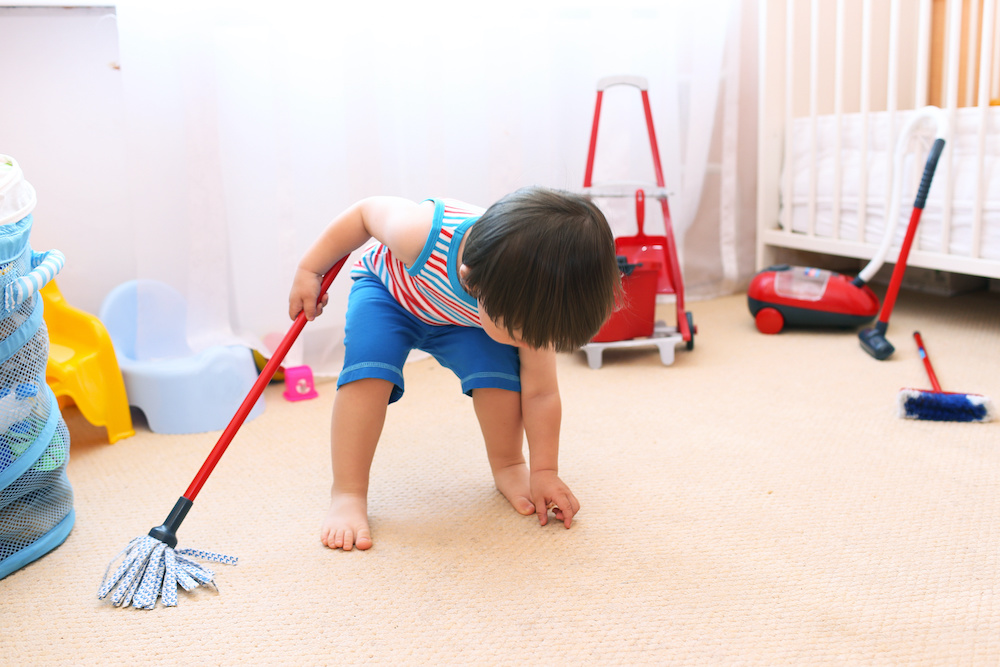
Play with me, talk with me—and give me chores?
Somehow, adding a tiny new person to your household has doubled your dishes and tripled your laundry. The sink is full of breast pump parts and bottles, and your little one needs a change of clothes after every meal. This might be when you stop to wonder: “Will their tiny hands ever be able to help with any of this... or is this just life now?”
Enter Dr. Maria Elena C. Salazar, who is a professor at the University of New Mexico and an expert in early childhood development. She’s a mom of three teenagers who regularly do the dishes, and she has some tips to share.
Chores for your baby
According to Dr. Salazar, it’s never too early to start dreaming about the chores your kids will do. Even in infancy, having your baby with you (in a body carrier or nearby) while you do things around the house is helpful. Will they become a chore prodigy who pulls weeds before they can walk? No. But children are always learning, and experiences like these teach them the routines of your home.
Chores for Your Toddler
As your baby grows into a toddler, they will want to help you. Children across world cultures are usually excited to help, starting at about 18 months. Is their “help” very helpful? Not at first. In fact, your chore will probably take longer and turn out messier. But parenting is a long game. If you never accept your toddler’s “help,” they will eventually lose interest in helping you, making it harder to start them on chores when they’re older. And sure, today you have to secretly refold all the laundry your two-year-old “folded.” But if they keep practicing, one day you’ll find yourself with a six-year-old who actually folds his own laundry, and you can thank your past self for some grade-A parenting.
Once your kiddo can walk, they can help you throw items away, or tidy up their room. You might invite them to wipe down surfaces within their reach — like those baseboards you have been meaning to clean! And key experts also say that those two- and three-year-olds are ready to dress themselves with help.
Chores for Your Preschooler
Come age three, four, and five, children have developed motor skills for tasks like stacking small pieces of firewood, or putting groceries away on low shelves. Ask them to get three tomatoes out of the fridge, and now you’re building number skills.
And speaking of tomatoes, Dr. Salazar said cooking is an especially good chore to think of as quality time. When chores become a chance to teach and talk with your child, you may feel less pressure to get it done quickly. So as you prepare your next batch of tacos, your three-year-old can be tearing the lettuce. When someone compliments you later on your delicious tacos, you can acknowledge the contributions of your assistant chef.
The Benefits of Chores - Beyond the Help
Chores build all kinds of essential skills, and may even make kids happier and improve their self-esteem. Dr. Salazar said children’s language skills grow from listening to your instructions and (sometimes) following them.
Acknowledging children’s effort helps them feel appreciated, but Dr. Salazar said not to go overboard with praise or rewards for household help. Many experts say it’s better not to tie an allowance or rewards to chores because it can send kids the message that they deserve to be rewarded or paid every time they pitch in around the house. Instead, try to build a culture where kids help out because that’s what people do in families. (If it’s in your budget, consider giving older children an allowance so they can practice managing money, but not tying it specifically to chores).
One way to build in “natural” rewards for older children is to sometimes schedule chores before an activity they like. This gives kids something to look forward to, without teaching them to expect a treat or payment every time they help. “I give chores before we’re going to do something fun,” said Dr. Salazar. “It’s, ‘OK, we can’t leave to the movie until the dishes are done.’” She said this approach can help motivate kids in a healthy way.
“I think we tend to underestimate children’s ability,” said Dr. Salazar, adding that an eight-year-old can cook an entire meal with supervision, if they are given the chance to learn the skills. Eight-year-olds can also do laundry, as this kid demonstrates. If we let them practice household tasks from a young age, she said, they will build the skills to do them well. And then, your life can be more like this:
Did you find this article helpful?
Subscribe to Bright By Text to get more free tips and resources for your child’s journey, right to your phone!
